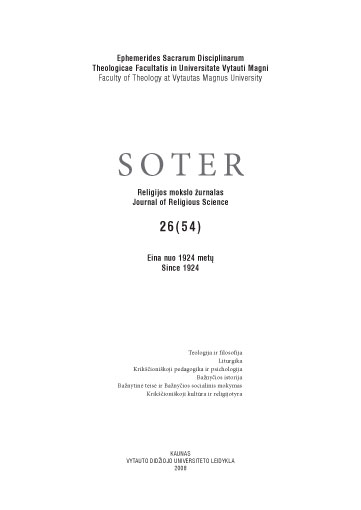Žmogaus kūno vertė apaštalo Pauliaus mokyme pagal Jono Pauliaus II veikalą „Kūno teologija“
VALUE OF PERSON’S BODY IN TEACHING OF APOSTLE ST. PAUL ACCORDING TO JOHN PAUL’S II STUDY “THEOLOGY OF THE BODY”
Author(s): Vida DaugirdienėSubject(s): Christian Theology and Religion
Published by: Vytauto Didžiojo Universitetas
Keywords: kūno teologija; kūno vertė; šv. Paulius,theology of the body; value of person’s body; St. Paul.
Summary/Abstract: According to the conception of modern person his (persons) body is considered having a value only for him: he uses his body as a source of pleasure (occasional sexual relations), body becomes “goods” (prostitution, pornography, creation and destruction of embryos having a purpose to take a stem cells), body’s parts being changed with a psychological urge to belong to the opposite sex (transsexualism), body’s damaging by violence nowadays becomes an ordinary event. Because of mentioned problems there is a danger that such attitude to a person as an object of use may be transmitted from one generation to another - person’s body will lose its value coming from a Creator himself. Such attitude to person’s body is a consumer’s attitude. However a person is a unity of a body and a soul. Without one of them a person is not able to exist. Body possesses dignity of God’s image; body is a person’s body because it is vivified by a spiritual soul, while a whole personality is devoted to be a temple of a Holy Spirit. That’s why to depreciate body means to depreciate a person created according to God’s picture. Study’s object: value of person’s body. Study’s purpose: to present understanding of person’s body in teaching of Apostle Saint Paul. Goals: 1. To explain meanings of Saint Paul anthropological terms, 2. To analyze understanding of body redemption and resurrection in works of Saint Paul, 3. To present analogy of “Head – body unity” in Epistle to the Ephesians, 4. To bring to light person’s body as a Temple of Saint Spirit. First of all we have to give commentaries about anthropological terms used by Saint Paul. Words sarks and soma we meet in Epistles Saint Paul are translated as body, nevertheless their meanings are different. Greek word soma in Saint Paul epistles means not a separate part of body but a whole person. However St. Paul presents soma as well and from negative side - when a person is under influence of sarks i.e. when kindness does not live in him. There is only one possibility to overcome oneself and it is a gift of God’s Spirit. Sarks is to be understood as human nature. Sarks expresses man’s estrangement from God, his frailty and scantiness, his solidarity with other creatures (they as well are distant from God). Greek word pneuma means moving air, spirit. St. Paul understands spirit as everywhere penetrating God’s might. That’s why person’s spirit unites his personality with God and encourages living together with him. According with Apostle person’s nature entices and seduces him to reject God’s will but God’s Spirit acting in person prompts him to be virtuous towards others and avoid bad behavior as well as gives him will power “to follow the ways of the Spirit” (Rom 8, 4). In St. Paul’s anthropology soma, sarks and pneuma are connected with psyche. Psyche means body’s vitality, but it is not resistant to death. We see that Apostle St. Paul characterizes a person as unity of body, soul and spirit (1 Tes 23). The purp
Journal: SOTER: religijos mokslo žurnalas
- Issue Year: 54/2008
- Issue No: 26
- Page Range: 47-58
- Page Count: 12
- Language: Lithuanian

